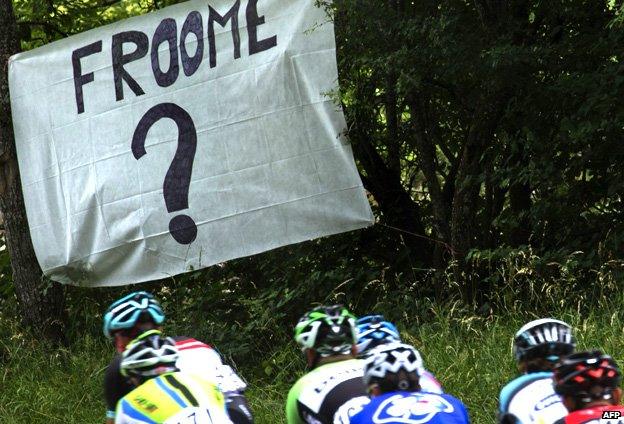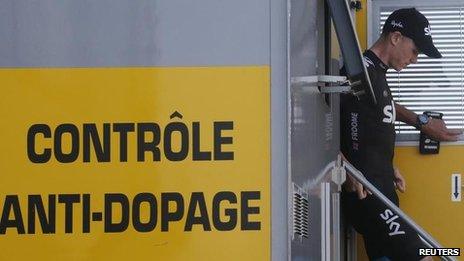Chris Froome: Crunching the Tour de France data
- Published

Britain's Chris Froome has won three stages of this year's gruelling Tour de France, and looks like he will become the second British overall winner on Sunday. But ever since he shot into the lead with an emphatic victory on the tour's first mountain stage, he has been forced to respond to questions about doping.
The problem Froome faces is that he is racing not just against his rivals but the ghosts of cycling past, Lance Armstrong and the others who used drugs to dominate the Tour de France in the 90s and 2000s.
The race against these ghosts depends on data and number crunching not bicycles.
The performances produced by men like Armstrong and Marco Pantani on mountain stages has never been matched since cycling got serious about doping and introduced a new drug testing regime called the biological passport.
Froome told BBC Sport: "I can understand why people are asking [about doping], given the history of the sport - they have been let down so many times before. But I'm also one of those people who's been let down. I've also believed in people who have turned out to be cheats and liars. But I can assure you, I'm not."
Others in the cycling establishment such as Sir Chris Hoy have rallied round to defend Froome. Sir Bradley Wiggins faced the same questions last year on his way to becoming the first Briton to win the race.
Dr Ross Tucker, a sports scientist at the University of Cape Town who has been analysing Tour data for the last four years, says the performance of the top 20 men in this year's Tour de France has been consistent with last year, and with 2011 and 2010.
The exception was Chris Froome in the first two mountain stages of the tour.
"When he won the stages of the Ax 3 Domaines and Mont Ventoux he was performing at a level that was similar to those athletes that are known to have doped in the past.
"That means there's been even more questioning around those performances, because people are looking at this person and saying, 'Well if he's not doping then how is he at that same level?'
"The answer to that is complex, because it's not simply that if you go too fast you must be doping. There are many other factors that affect the performance on a given day and so it needs a little bit of caution and a little bit of insight to understand fully what the data is saying."
After the Ax 3 Domaines stage - which Froome won in the third fastest time ever - one critic suggested Froome's performance was "almost mutant".
He followed that performance by winning the legendary stage up the Mont Ventoux.
His performance was brilliant but it was nowhere near the the fastest time ever on Mont Ventoux. Others have climbed Mont Ventoux some three minutes faster, while Pantani's time in 1994 was nearly 90 seconds faster. But Froome's time was similar to times recorded by Armstrong and Pantani in the 2000s.

Tucker urges caution in making such comparisons.
"The performance is fast again, so there is a reason to ask the question but the evidence seems to suggest that they had a tailwind on the day, and that may have helped him up the climb faster than in previous years," he says.
The media asked Team Sky - the British team Froome races for - to release all the data they have on him, in order to combat accusations of doping. Sky refused because they thought it might help rival teams.
They did however provide information covering the last two years of Froome's riding to the French sports paper L'Equipe. That data has been analysed by a cycling coach and physiologist, Dr Fred Grappe.
He concludes that Chris Froome's performance isn't superhuman, or "mutant" - but simply at the upper bounds of what is physiologically possible.
"The level of performance is to be expected according to his power profile between 2011 and now. The power profile hasn't changed in the last two years. He is the same cyclist," Grappe says.

He also says that if you drew a curve of his recent performances then the fast times he recorded for the Ax 3 Domaines and Mont Ventoux stages wouldn't be out of place.
But it would be wrong to just focus on those two climbs. Tucker says we should also look at the other mountain stages such as Alpe D'Huez where Froome was beaten.
"The ability to sustain exceptional power outputs demands certain questions to be asked. And so the corollary to that is at soon as the athlete comes down and he shows signs that he isn't able to recover like a superhuman from one day to the next, those are reassuring signals.
"And so for me when we analyse the data, for example from Alpe d'Huez, we see for the first time in the race that Chris Froome is also below certain benchmarks from the past."
There is no evidence that Chris Froome is doping. He has been tested 19 times in this Tour de France alone. Nothing in his performance data shows he is doping.
But he is a victim of Lance Armstrong and the other proven drug takers who haunt the Tour de France.